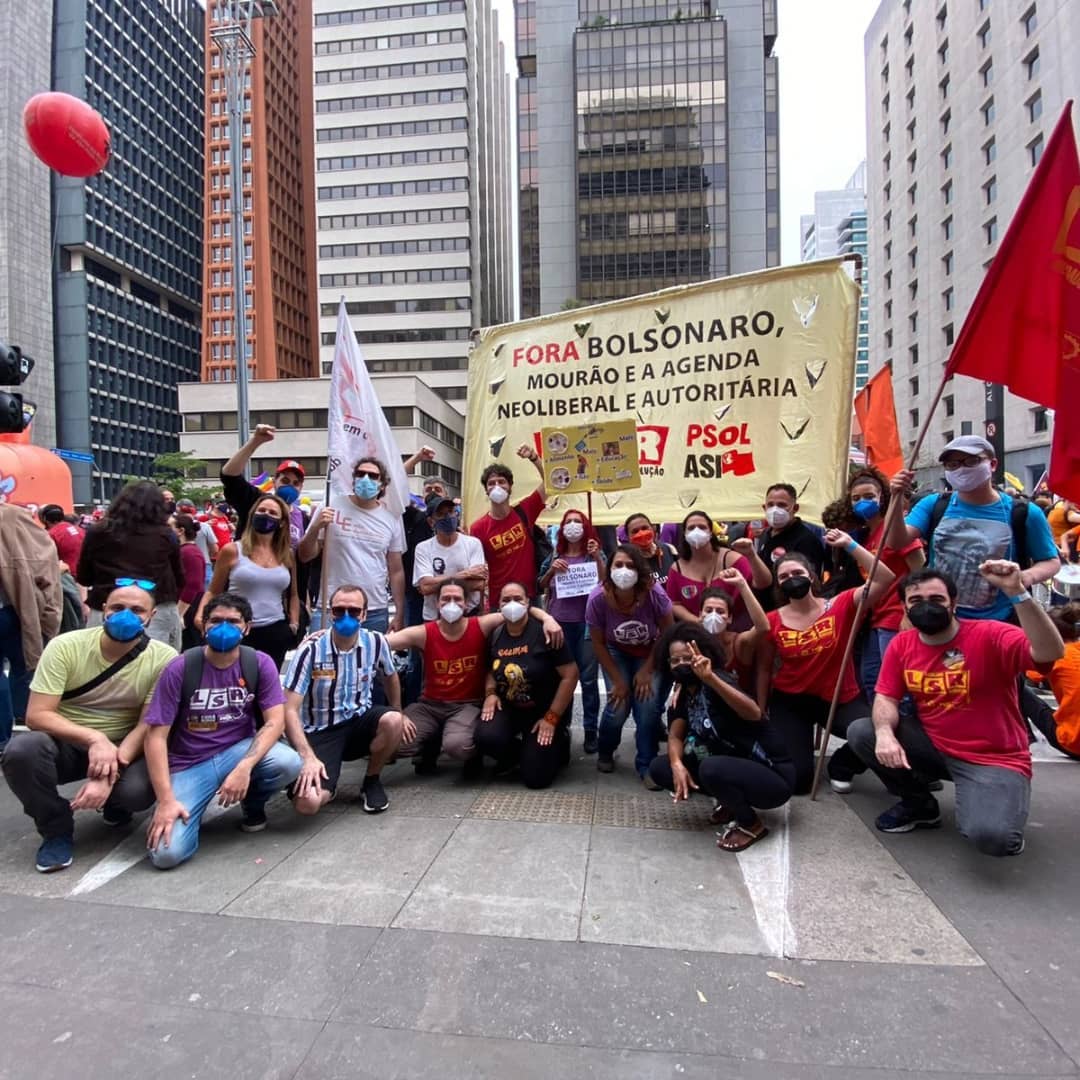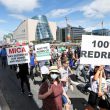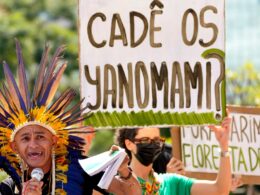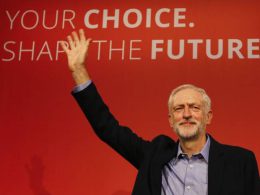By Marcus Kollbrunner, Delegate from LSR at the CongressLiberdade, Socialismo e Revolução (LSR) — our sister organisation in Brazil
The Seventh National Congress of the Partido Socialismo e Liberdade (PSOL) took place 24–26 September against the background of the pandemic, and in the context of a complicated political conjuncture. The situation is marked by the developing struggle against the genocidal, extreme right-wing government of Bolsonaro, in which the working class has not yet decisively entered the battlefield. This has led to a series of debates within the party and consequently new realignments.
However, the virtual format of the Congress made necessary by the pandemic restricted the debates in many ways. In the in-person ballot voting to elect delegates to state congresses preceding the National Congress, the number participating grew from 27,000 in 2017 to 50,000 now. But during the virtual debates preceding the actual voting at congress, only about 5,000 participated, just one in ten of those who voted to elect delegates. Another drawback was that the debates and the voting process were separated in time as a result of this procedure.
The justification for holding the Congress in these difficult conditions was the need to elect a new leadership to reflect the new composition of the party. Guilherme Boulos and other activists from the “Homeless Workers’ Movement” (MTST) have recently joined the party, forming in the process a new current, Revolução Solidária (RS), now the third largest in the party. Resistência, which emerged from the unification of the New Socialist Organisation (NOS) and Movement for an Independent Socialist Alternative (MAIS), both splits from the PSTU, is another newcomer, and is now the fifth largest current.
Central theme of the Congress
The central theme of the Congress was the discussion over tactics in the current situation, faced with the Bolsonaro government, and preparing for the 2022 elections. The restoration of former President Lula’s political rights after his release from prison, means there is the potential to defeat Bolsonaro in the elections. Even though the working class has not yet acted decisively in struggle, this situation has accelerated a process of realignment within the party leading to its political reconfiguration.
This new situation led to a certain change in the position of LSR (ISA) before the congress. Since PSOL was first established in 2004, we have argued that it is necessary to establish a consistent revolutionary pole of attraction to defend a socialist programme and democratic procedures, independent of the two largest political blocks within PSOL — Primavera Socialista (PS) and Movimento Esquerda Socialista (MES) — who represent an electoralist tendency, including a policy of of alliances with “center-left” parties and support for taking money from corporations.
After the 2017 Congress, however, we began to see a realignment between the currents. This was due largely to the coming together of the leaders of the MTST and PSOL. The MTST had been on the front line of the struggle in Brazil after the start of Dilma Rousseff’s second Presidential term. Then it played a key role in opposition to the illegitimate government of Michel Temer, following Dilma’s impeachment. The LSR encouraged this process, even though other opposition currents within PSOL opposed this. We were the first current to raise the possibility of standing Guilherme Boulos as Presidential candidate in the 2018 elections during meetings of the party leadership.
At the same time, some of the currents in what had been the foremost ‘left’ bloc within PSOL, like MES, took a sectarian approach towards the MTST. MES also had also an ambiguous position towards the parliamentary coup and impeachment of Dilma in 2016, giving for example support to “Operation Car Wash”, a huge anti-corruption drive led by a right wing judge, that put Lula in prison (with the judge who imprisoned him going on to become minister of justice in Bolsonaro’s government).
As a consequence, we participated in the formation of a third bloc as a step towards building a new Left opposition in PSOL, which later came to be called “Semente” (“Seed”). As well as LSR, this included currents called “Resistência”, “Insurgência”, “Subverta” and others. Even so there was a contradiction within this bloc, because parts it also found themselves linked up with the majority leading current ‘Primavera Socialista’ (PS) in a wider bloc called PSOL de Todas as Lutas (“PSOL of All Struggles” PTL). Although we agreed at that time with PS on some important issues, such as the need for unity with the MTST and opposition to “Operation Car Wash”, we maintained deep disagreement with their programme, their political approach to alliances, the composition of governments and methods of party democracy.
In order to clarify our position, we launched a manifesto at the beginning of the year, with our analysis of the current situation, our tactics for struggle, and outlining our main programmatic points. As we were in the process of launching the manifesto, there was a turn in the situation with the restoration of Lula’s political rights. With this development, our differences with others in “Semente” deepened, since the other currents adhered to the line that the PSOL should not launch its own candidacy for the next elections and instead, form a front with Lula, even in the first round.
We argue that even though PSOL will probably be squeezed in an election which will be polarized between Bolsonaro and Lula, it needs to defend a socialist programme in the elections, to show a real way out of the crisis and how to defeat Bolsonaro, Bolsonarism and the capitalist system that created them. There is no doubt about the nature of Lula’s project. He wants to form a front including right-wing parties and, because of this, he is willing to go to great lengths to make concessions, repeating the same policies of class conciliation that led to the current situation. We have seen this in his speeches against taxing the rich and in favour of the privatisation, even if partial, of Caixa, the second biggest federal bank. Obviously, in the second round of the elections, we will support him to defeat Bolsonaro, as we did when we supported Haddad against Bolsonaro in the second round in 2018.
There is no question of the need to unite the struggles of our class in a single front against Bolsonaro, but this is not the same thing as forming an electoral front. In fact, the political currents that support this approach are already lowering their criticisms of the previous governments formed by the Workers’ Party (PT) of Lula and Dilma. This even found an echo in the statements of “Semente”. As a consequence, we decided we could not support the political platform of “Semente”, and drewe up our own political platform for the Congress. Unfortunately, time prevented us from gathering enough signatures to put our platform to the national congress. In the different Brazilian States our tactics varied, from making joint political platforms with currents from “Semente” in some places, to maintaining an independent position in others.
In the pre-Congress discussions and especially during the National Congress itself, the “Semente” camp aligned itself completely with the majority PTL, expressing little or no differences. They did this even on issues where Semente already had a different public position, for example in opposition to the participation of the PSOL in the Workers’ Party mayoral cabinets in Diadema and Maua in São Paulo state, or in a future Lula government. Our votes reflected our position on these questions, which were almost entirely in favour of opposition resolutions.
Congress resolutions
The resolution on the national situation proposed by the PTL continued the extreme programmatic watering down that has already taken place. Important themes, such as the suspension of payment and audit of the public debt, or the nationalisation of the financial system under democratic control, have been abandoned. The text limits itself to defending a “reconstruction of the country on an anti-neoliberal basis”, showing that the programme is being downgraded, in preparation for a possible alliance with the PT. On economic policy, there is only talk of “progressive tax reform”, without even mentioning more directly the taxation of large fortunes.
The opposition resolution had a better emphasis on struggle, defending the need to unite the struggles against Bolsonaro, but also making a necessary criticism of the PT leadership for not putting the necessary emphasis on the need to mobilise, instead favouring the tactic of ‘bleeding’ Bolsonaro until he can be defeated in elections. In addition, it had more specific programmatic demands, including ‘Down with Bolsonaro and Mourão’, an emergency aid package equivalent to the minimum wage, opposition to attacks and repression, but also including issues such as the public debt and the nationalisation under public control of the financial system.
The resolution on elections proposed by PTL argued that PSOL should not launch its own candidacy, with tactics to be defined by an electoral conference, which will actually merely be a meeting of the National leadership under another name. Previously PSOL has held large electoral conferences with elected delegates. Their emphasis is on building an “electoral front of the left”, that is “with the PT”. The text also says that “We do not simply want a government of ‘national salvation’: we want a left government”. This formulation obviously raises the question of participation in a PT-led government. What other alternative would there be, if PSOL does not have a candidacy for president? This issue is not yet posed nationally, although there will be pressure to do so, as we have already seen in some local governments.
The opposition resolution defended the right of the Congress to propose its own candidacy saying: “In this sense, the [Congress] resolves that the party will have its own candidacy in the first round of the 2022 presidential elections. Today, the name of comrade Glauber Braga is presented as a pre-candidate for the presidency for debate at the next electoral conference of the party, which should define the programme and the name of our candidate for the Presidency of the Republic.” Although LSR does not specifically endorse the name of the MP Glauber Braga, his pre-candidacy has raised important programmatic points. But the issue of a PSOL candidacy in the first round has been a central issue for us. That’s why we were justified in also voting for this resolution.
In addition, the opposition presented a resolution defending the position that PSOL should not participate in an eventual Lula government, something that we also defend in our manifesto. The PTL presented a resolution which clearly fudged the issue, to “Reaffirm the position of not participating and not aiming to participate in governments of right-wing parties or those that promote attacks on workers and reproduce the liberal/conservative agenda and/or authoritarian aspects”. This is something that should be more than obvious.
On the subject of campaign financing, the PTL presented a good resolution, which proposed that the party does not receive money from owners of large companies and banks, nor from initiatives such as RenovaBR, a liberal private fund intended to “train” politicians. The opposition agreed with this proposal and we also voted in favour.
National leadership
Because of our disagreement on key issues, it was obviously not possible for LSR to vote for the PTL’s slate for the national leadership. But despite voting with the opposition on most of the resolutions, we did not join the opposition bloc, led by the MES and Fortalecer.
This is for several reasons. Fortalecer was until recently allied with the Primavera Socialista (PS), and agreed with them on key programmatic and alliance issues. We have also disagreed with the MES for a long time on a number of important issues, on their positions on alliances, campaign financing, “Operation Car Wash”, the approach to the MTST, their support for voting for the bourgeois politician Baleia Rossi as speaker of the lower house in Congress, to give a few examples. Where these currents are in the majority, they often use the same bureaucratic methods as PS.
The polarisation of PSOL into two blocks has not helped to raise the level of the debate, on the contrary. The issues are much more complex than is expressed in this binary conflict, as we saw in the case of the “Semente” camp, in which important debates were avoided so that it could maintain its relations with the PTL block. This is true also for the other side.
There was an important debate between positions in a series of articles, but the debates in social media and in the congresses have been of a very low level, aggravated by the virtual character of the congress. Sometimes the discussion was more like a food fight, with the congress chat turning into a horror show of moral accusations and swearing.
Given this situation, we explored the possibility of building a third alternative proposal for the election of the new leadership. Unfortunately, this was not possible, so we abstained in the vote for the national leadership.
But that does not mean that we abstained from the debate or that the debate is over. The next period will be turbulent, not only for the general situation in the country, but also within the party. The period up to and after the elections will be marked by a new wave of crises and ruptures in the various currents, opening up space for new alignments. Just as we went through important turning points with the defeats in 2016 and 2018, the next period will bring new twists and turns.
To some extent, this is an advantage of the PSOL. It is not an ossified party, it is possible for there to be real changes, even if they are often confused with disputes over the apparatus.
This next period will possibly be the biggest historical test for the PSOL so far, where the challenge will be to resist a growing institutional pressure and find the right programme and path to independent struggle by our class. The challenge will be to build a socialist alternative, armed with a socialist and revolutionary programme and strategy which can be up to the task of the great battles to come.












